
Reddi To Rumble
By Andrew Joseph, Features Editor; Ian Jackson, Photographer
Automation Bemis Company Bizerba Canada Inc. Cascades Inc. Cryovac Curwood Multivac Canada Norampac Reddi Food Reiser Sealed Air CorporationNew meat processor makes a splash with cutting-edge thermoforming
It’s not easy to start up a new business when the economic market is in a downturn, especially in the established, world-renowned Alberta beef industry, where there is never a shortage of existing fierce competition. But Reddi Food Solutions Inc. has done just that, quickly beginning to carve out a name for itself in a tough market with razor-thin margins.
Located 33 kilometers south of Edmonton in Leduc, Alta., Reddi Food and its 18 employees process and pack fresh and frozen meat products such as beef, pork, chicken, lamb and veal for private-label and no-name brands to serve customers in the retail and foodservice sectors.
“Right now we have a fairly even split on our business,” Reddi Food president Wayne
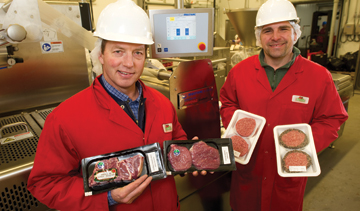
(From left) Wayne Porterfield, president of Reddi Food Solutions Inc., and Kevin Fehr, vice-president of sales and marketing.
Porterfield told Canadian Packaging during a recent interview. “I would say that we have a 50-50 split processing fresh versus frozen meats products, which are distributed evenly between our retail and food service customers.”
Situated in beef country, Reddi Food’s output consists of 70 per cent beef, with the pork, lamb and veal portions making up the remainder.
Housed within a leased 6,000-square-foot refrigerated facility with the capacity to process approximately 30,000 kilograms of value-added products per week, Porterfield says the company’s location traces back to a unique business opportunity.
“The facility was originally conceived of as a research and product development center by the Alberta provincial government,” Porterfield recalls.
“But in 2007, the government decided to increase the facility’s use and expanded the building to create a business incubation section that allows start-up companies like ourselves to lease refrigerated floorspace and grow for a period of three to four years.”
Known as the Agrivalue Processing Business Incubator (APBI), the facility is more than just a multi-tenant building. While it does provide the infrastructure, the APBI also offers ample support to help new companies grow more rapidly. At the end of a contract, the APBI hopes to have each company succeed and move out into its own manufacturing facility.
Porterfield says that Reddi Food moved into the APBI in August of 2011 and began its operations in October. “The facility is second-to-none, as far support, cleanliness and design goes. I’ve been in many other facilities over the years and none measure up to this one.

Reddi Food’s Multivac R175 CD DARFRESH thermoformer uses clear high-quality film supplied by Curwood to produce highly hygenic vacuum-skin packs.
“It is CFIA (Canadian Food Inspection Agency)-registered, which allows us to ship interprovincially as well as internationally,” he says, adding that the facility also has on-site support staff including: meat scientists, quality assurance, business finance, maintenance and much more.
“We are HACCP (Hazard Analysis Critical Control Points)-certified which helps to ensure our products are best-in-class with respect to food safety.”
While acknowledging that Reddi Foods is a newcomer to the processed meats sector, Porterfield and his senior staff possess a combined 140 years-plus experience in the industry, and have already garnered 23 customers.
The meat processor is currently serving customers in the retail and foodservice industry within Western Canada, but Porterfield says it has plans to market its products and services throughout Canada and internationally.
“We are also a Halal-certified company,” he adds. “We are certainly seeing a growing demand for Halal products, and we predict this trend will continue for many years to come.
Porterfield notes. “And, with initial projections of sales approaching $2 million for Year One, in five years time we would like to see our sales pushing $50 million, and operating our own building.”
While some might consider Porterfield’s statement to be a lofty dream, Reddi Food is attempting to position itself to make it reality, as it continues to significantly grow its market share.
“It’s all about the pennies,” says Porterfield. “The meat-procesing and packing segment is a very tough business, and a lot of our measures are to the one-hundreth of a penny based on a per-kilogram of product.
“That’s why we need to do it right the first time to maximize our potential.”
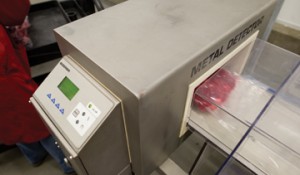
vacuum-sealed pouches of select Reddi Food boneless beef cuts are quickly conveyed through a Bizerba metal detection system to ensure optimal product safety.
Porterfield acknowledges that because it is still a new company, started a mere six months ago, establishing peaks and valleys in terms of its own production is difficult at best, but he says the company experienced a large growth spurt in March, and based on customer orders, sees more of the same in April and May.
With business continuing to look up, customers are increasing their orders for the 100-plus SKUs (stock-keeping units) Reddi Food is currently producing.
“Of course what really helps is that we also have some very capable equipment to help our production line easily handle the requst of our customers,” says Porterfield.
Porterfield says his many years of experience in the industry means he realizes that how a packaged product looks and performs is equally as important to the customer, as well as the consumer.
To that effect, the company looked for a thermoformer meat packaging machine that could perform multiple functions and grow with the company.
“The choice wasn’t too difficult for us,” muses Porterfield. “We chose a Multivac.”
Described as compact and powerful, the Multivac R 175 CD is a thermoformer designed for small- to medium-sized batches, which creates the state-of-the-art DARFRESH vacuum skin packaging (VSP) using special films to envelope the product and seal over the entire surface of the pack like a second skin to preserve its shape, texture and product integrity for a high-quality look on the store shelves.
“Our new Multivac DARFRESH system has been working great for us and our customers,” Porterfield enthuses.
“The DARFRESH packaging machine makes a vacuum-tight retail pack that gives the fresh meat products a longer shelf-life,” he says. “As well, we are able to produce a package that is very appealing to the consumer visually.”
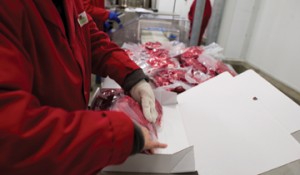
After passing through a metal detection unit, a Reddi Food employee hand-packs product into a corrugated carton manufactured by Norampac, a division of Cascades Inc.
While the actual DARFRESH process is not exactly a new technology—Multivac and Cryovac, a division of Sealed Air Corporation first developed it some 20 years ago, it is still a young concept in North America’s meat business.
The DARFRESH VSP process begins with the chamber being evacuated of air while the top film web is drawn up to the ceiling of the dome, using the heat from there to gently wrap itself over every contour of the product.
The top web is then heat-sealed to the bottom web to create a hygienic and visually appealing pack that customers like Reddi Food demand.
While the meat processor generally runs the Multivac R 175 CD at around six cycles per minute, he is quite pleased with the results.
“Our customers like it,” exclaims Porterfield. “While the skin provides a leak-free pack, it is also easy for the consumer to open, with an easy-peel corner.
“And with such tight skin surrounding the meat—and the air removed via vacuum—the Multivac gives us a package that guarantees a long shelf-life.”
Along with a hygienically secure pack, the durable Multivac R 175 CD is also a highly hygienic system—built from stainless steel featuring its patented hygienic chain guide design, lift units, motors, valves and cabling. The thermoformer is also constructed with smooth sloping surfaces without the pitfalls of recesses, corners or sharp edges, making daily clean-ups easy to perform properly.
Says Porterfield: “It really is easy to clean. The interior of the Multivac and all of its parts are fully accessible thanks to the easy-open side panels so we can clean all of the parts of the machine thoroughly.”
The Multivac R 175 CD also features: full operator safety systems; a simple-to-use 7.4-inch color touchscreen control panel; a production data acquisition and storage memory for up to 200 recipes; technologically advanced electric lifting systems; and full flexibility in the use of cutting systems, packaging formats and materials.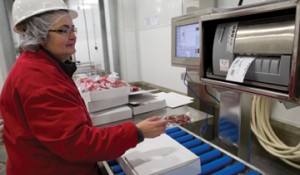
“The results we have achieved from the R 175 CD have been fantastic,” says Porterfield. “When we have enough business, and the one we have is at capacity, I could see us purchasing another machine from Multivac.”
Porterfield says that after sampling films from a few companies, Reddi Food is now running with film manufactured by Curwood, a part of the Bemis Company, as it provides what he considers the optimal results for his needs.
Bizerba is another equipment manufacturer Reddi Food has chosen for its reliability, says Porterfield noting that he has a GLS metal detection unit and a GLP box labeler, and is currently looking to purchase a GLMI price labeler.
“The GLP labeler is easy to use,” notes Porterfield saying that Reddi Food uses it to add product data like weight, barcodes, best-before dates, product name and more.
“It takes seconds to add a new roll of labels, and because no tools are required for set-up and maintenance, our overall costs are reduced.
Cryovac has been supplying the bags, trays and Lid 1050 lidstock for the Reddi Food meat products.
“We offer a black tray and a white tray, but really the color is just a customer preference. These barrier trays are used in conjunction with oxygen and carbon-dioxide gases in each package to suppress bacteria growth and maintain the beautiful red color of the product,” explains Porterfield.
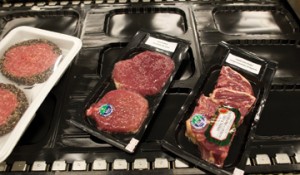
Among its many products, Reddi Food packages sewasoned beef patties (left) in a lided tray, and veal cutlets and lamb loin chops in vacuum skin-packs placed in black trays.
While the black-lidded trays are being used by the Multivac thermoformer, Porterfield says that Reddi Meats has begun testing the white-lidded tray packs on a Ross A10 tray sealer from Reiser Canada.
Porterfield says he has been quite impressed with the results from the Resier A10, but as a new company, he is waiting for customer orders to catch up to capacity before adding more jobs to its sked.
He adds that the company is also in the process of purchasing two more pieces of equipment from Reiser: a Vemag HP15 vacuum filler and a GB240 portioner for ground products—equipment that Reiser has allowed Reddi Food to test in its processing plant for the past four months.
Despite being a new player in the meat processing market, Reddi Food already has a very mature outlook in the way it conducts its day-to-day business.
“Yes, we have financial targets to meet, but our daily focus is on quality, food safety and service levels,” he notes naming “zero product defects” as the main target, along with service levels measured by on-time delivery and order fill rates.
“For us, shelf-life and eye appeal are very important aspects of our products,” sums up Porterfield. “But just because we are a young company now, it doesn’t mean we can’t act in a mature manner.
“We have an excellent starting ground to prove ourselves with this government-leased facility, and we have state-of-the-art equipment like the Bizerba, Reiser and Multivac machines.
“And, along with providing high-quality cuts of meats in great packaging, Reddi Food is ready to succeed.”
Advertisement

